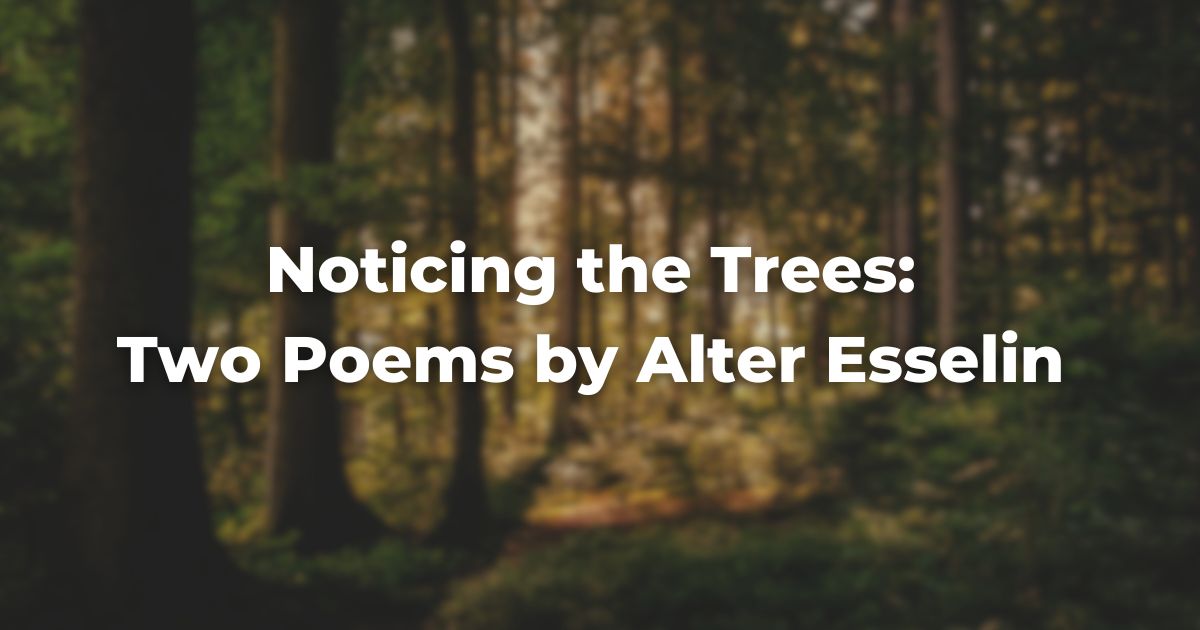My parents both came from Yiddish-speaking homes, so the Yiddish language and culture are part of me. While I do not speak fluently, I love all things Yiddish.
For Tu B’Shevat, known as “the birthday of trees,” it felt natural (pun intended!) to draw from these two tree poems by Alter Esselin, some 50 years after his death.
The Russian-born Esselin (1889-1974) was an American poet who wrote in Yiddish. He lived in Los Angeles for some 20 years before settling in Milwaukee. His hundreds of poems received significant recognition, including the Harry Kovner Award for the Best Collection of Yiddish Poetry. This is all the more remarkable because of his lack of education.
His father died when he was ten years old, and his mother sent him (as the eldest of four young children) to apprentice for five years with a carpenter which was his primary profession for the rest of his life. He came to this country as a 15-year old, but the Uncle who was to sponsor him died while he was in transit, and other relatives showed no interest in him. He took the name Alter (“the old one”), following an Ashkenazic custom of renaming the eldest surviving son in the event of a father’s early demise as a way of asking the Angel of Death not to bother the family again.
The themes of his poetry reflected the themes of his own life: loneliness, the bite of conscience, and the scourge of poverty. In writing about them he attempted to defy them, or at least overcome them.
These two poems, translated by Joseph Esselin, the poet’s son, focus on trees. I strongly recommend that you discuss them with friends and family, perfect for Tu Bishvat. (I suggest that you read each poem aloud before using the questions provided to reflect.)
Silence Beyond Words
In the silence of the night
The trees stand in melancholy calm.
Only a faint rustle of leaves.
On high—a star tremor.
Fireflies flash in the folded bed linen of the fields.
Silence streams from the moon,
Silence covers the world.
And from my heart there comes joy,
Joy that overflows in courage, praise
And expectation of honors.
How quick the flight to highest height;
The fall into deepest abyss.
Questions to Consider:
- What is “melancholy calm”? Have you ever felt that?
- What is the symbolism of the fireflies—do they hold out glimmers of light, of hope?
- If “silence covers the world,” how can and why does joy come from the poet’s heart?
- How might we tap into our own ability to feel joy even when lonely or experiencing other life challenges and life difficulties?
- In this poem, what is the significance of trees?
- How might this poem affect our celebration of Tu B’Shevat this year?
Trees
Trees die not alone.
They take along with them:
The violins of the winds,
The hymns of the nests
The mirrors of the sun,
The laughter of leaves,
And a delicate perfume.
They leave behind only the mystery
Of their unity and patience.
Questions to Consider:
- Think about each of the five images presented (lines 3-7)—each succinct yet memorable–and how you relate to each. If you are with family or friends, perhaps each of you can share one memorable image and why it touches you.
- How does each of the five images present a different facet of a tree’s experience?
- Have you ever experienced “the violins of the winds” or “laughter of leaves”? When have you experienced these?
- Do such experiences leave behind the “mystery of their unity and patience”?
- In this poem, what is the significance of trees?
- How might this poem affect our celebration of Tu B’Shevat this year?
So, what do they mean?
We might want to take a moment to consider how these two poems intersect. “Silence Beyond Words” encourages us to take note of the environment the tree is in. Because trees are found everywhere, this encouragement may be understood as a call to mindfulness, to hit the pause button, and soak up whatever is going on, at least until we sense “the silence” that “streams from the moon.”
The poem “Trees,” on the other hand, asks us to consider what is lost when a tree dies, for trees bear gifts of “violins,” “hymns,” “mirrors,” “laughter,” and “perfume.” Every tree, the poem tells us, bears these gifts. Yet, in a certain sense, a tree dies whenever we pass it by and do not notice it, leaving the gifts unreceived.
Tu B’Shevat reminds us of these things as a minimum.
Let us notice the trees, the beauty and wonder of this world. For:
Noticing is the first step to acknowledging.
Acknowledging is the first step toward receiving.
Receiving is the first step toward gratitude.
Gratitude is a step toward a richer spiritual life.
Hag Ha-Eitzim Samei-ah! Have a wonder-ful Holiday of the Trees–Tu B’Shevat!
Author
-

Rabbi Dr. J.B. Sacks (he/him) is the spiritual leader of Congregation Beth Shalom (Palm Desert, California).
The first openly LGBTQ+ rabbi in the Conservative Movement, Rabbi Sacks is an advocate for inclusion in Jewish life and social justice. His most recent publication is Psalms in the Key of Healing.
Rabbi Sacks is the eighteenth generation of rabbis on his mother’s side and lives with his husband Steven Karash in Palm Desert, California. They have an adult son, Evan.
View all posts




